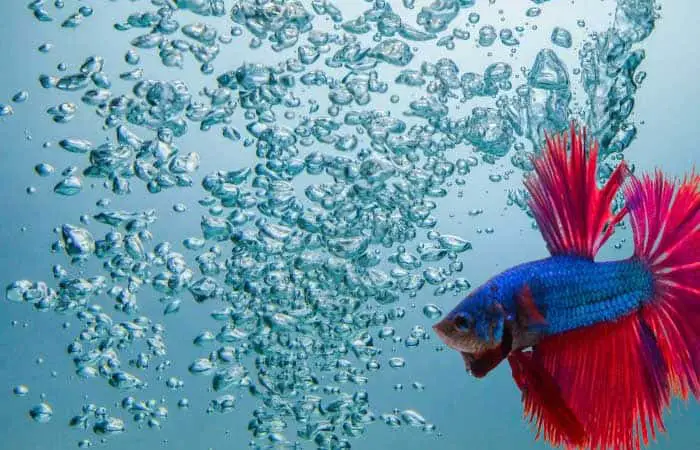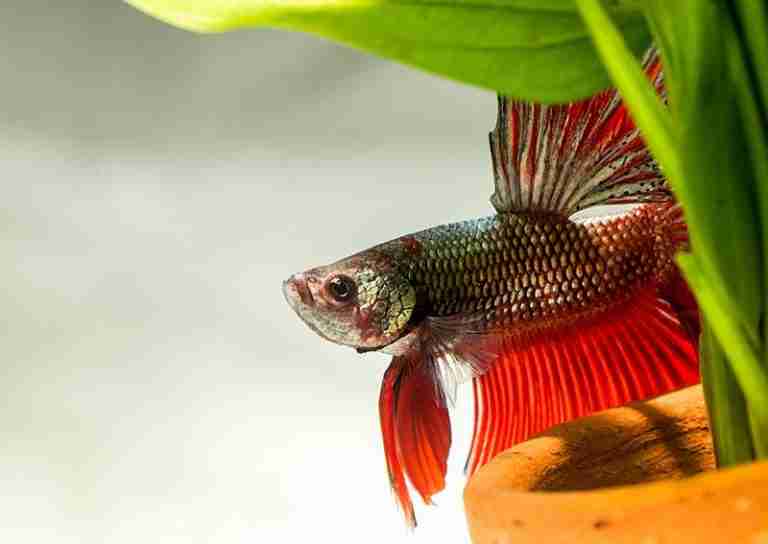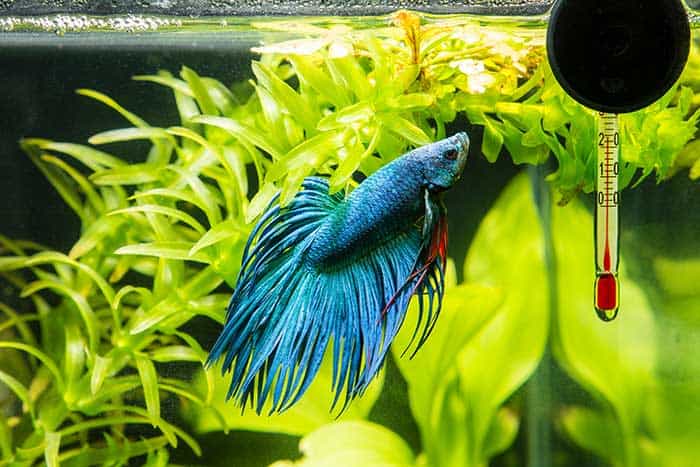Do Betta Fish Have Teeth (for biting and fighting)
Betta fish are known for their aggressive behavior, but do betta fish have teeth? It’s a common question among betta fish owners, and rightly so! If betta fish have teeth, surely they can bite your fingers or cause serious injury to other fish in the tank!
Betta fish have a small set of teeth that are difficult to see without a magnifying glass. Because betta fish are mainly carnivorous, they need teeth to bite and chew their protein-rich diet of meaty foods. Aside from eating, betta fish use their teeth for so much more, including fighting and mating.
The main reason betta fish have teeth is to feed on meaty prey such as worms and insects found in their natural habitat. These razor-sharp pegs help bite the meat into small pieces while a flatter set of teeth at the back of the mouth are used for grinding and chewing.
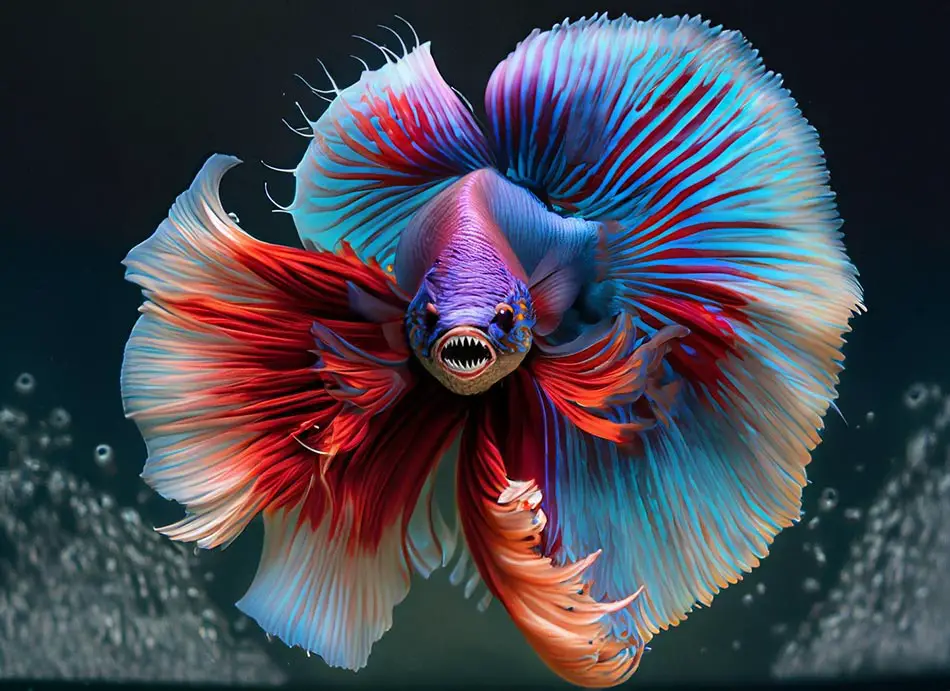
Sharp teeth are not only useful when feeding, they can also be used as a defense against potential predators when competing for territory and are commonly used during mating rituals.
This article explains everything about betta teeth, from what they look like to their wide array of uses. Most importantly, you’ll know whether to keep your hands out of the tank at feeding time.
While you are here, I also wrote a care guide where you can learn everything you need to know about betta fish.
How Many Teeth Do Betta Fish Have
While they may not be obvious, betta fish actually have a mouth full of tiny sharp teeth hidden within those lips. These pointed pearly whites are perfect for helping these colorful creatures devour their food.
A betta fish has approximately 50 teeth which are a mixture of sharp incisors at the front for ripping and tearing their food and a set of pharyngeal teeth for grinding and chewing, located in the pharyngeal arch at the back of the throat.
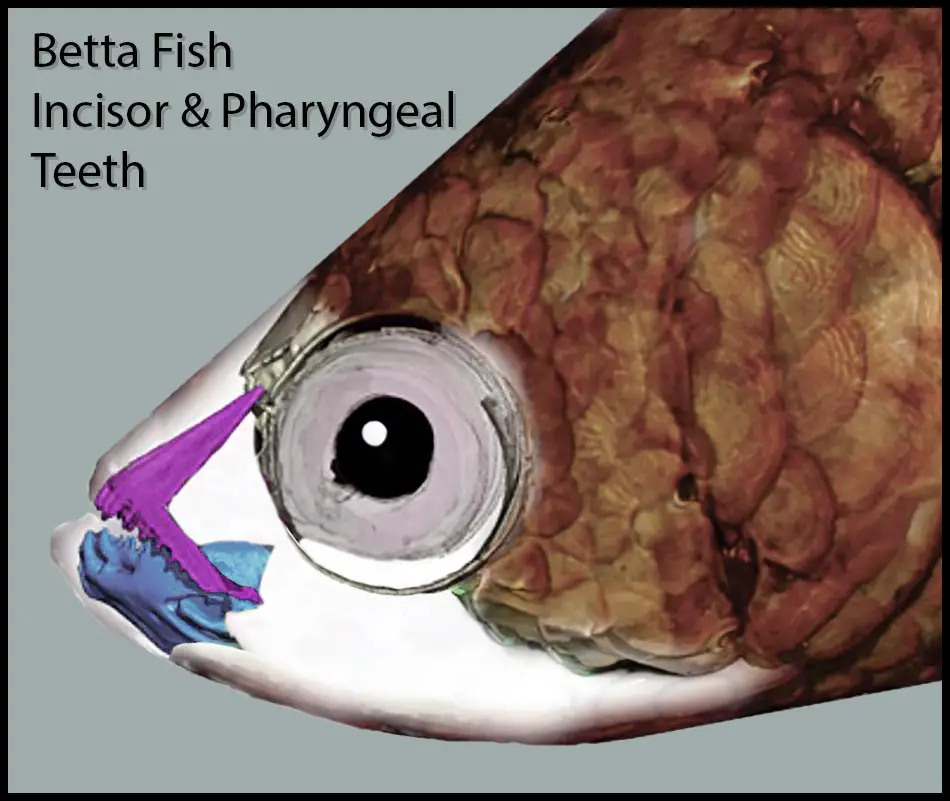
When betta fish bite, they can certainly pack a punch and make short work of their food. Knowing that a betta fish has so many teeth and that some are very sharp can also be intimidating, but they are certainly not Piranha-like in size.
What Do A Betta Fish’s Teeth Look Like
A betta’s teeth don’t look like the typical mammalian tooth. Betta fish teeth are sharp and pointed at the front and flat like human molars at the back. Located on an upturned mouth that helps with surface feeding, these small white teeth are barely visible.
The best time to see betta fish teeth is when they are gulping air at the surface or feeding on a large piece of meat that they are trying to break apart. Because a betta’s teeth are so small, try using a large magnifying glass, or take a picture that you can zoom into for a closer look.
When you see these tiny teeth, they won’t be so intimidating but don’t get too complacent, as they can cause serious injury to other fish.
What Do Betta’s Use Their Teeth For
The primary function of a betta’s teeth is for eating. Despite their tiny jaws, bettas can munch on a variety of foods such as meat and live food like baby brine shrimp or daphnia, which provides them with essential nutrients for a healthy life. Betta fish use their sharp incisors to tear up the meat into smaller pieces while the pharyngeal teeth chew it up.
Using their powerful jaws and razor-sharp teeth, bettas can consume pieces of food larger than themselves, allowing them to thrive in both freshwater and brackish environments where prey items come in all shapes and sizes.
While many people view these vibrant creatures simply as decorations for aquariums, in truth, they are highly adapted predators capable of hunting down whatever comes into their path!
Betta fish also use their teeth when fighting and won’t hesitate in using them to defend themselves from other fish. Betta fish are called Siamese Fighting Fish for a reason, and their teeth make them formidable opponents, even to larger fish.
Betta fish also use their teeth when mating, as gentle biting is part of the courting ritual from both male and female betta fish. Biting should be gentle during courtship, and if each fish accepts the other, mating can commence. If biting is too rough, it’s often a sign that one betta fish doesn’t want to mate, and the other will often swim away.
Do Betta Fish Bite Other Fish
Betta fish can make great community fish when paired with suitable tank mates, but avoid pairing them with aggressive fish species like cichlids, gouramis, and angelfish. You should also avoid pairing two male betta fish in the same tank, as fights are inevitable.
Betta fish are very territorial, and in the heat of a fight, a betta fish won’t hesitate in biting other species of fish to defend themselves. Because a betta’s mouth is so small, its bite range is limited to biting at tails and fins, although some scale injuries can be inflicted.
When it comes to betta fish biting other fish, here are some things you should know:
- Betta fish teeth can inflict minor wounds on larger fish, but it’s very rare for them to cause serious harm unless the victim is particularly weak or small. A betta’s sharp teeth often inflict fin and tail tears as they clamp onto their opponent.
- Aggressive bettas may attempt to start fights with larger fish by using their powerful jaw muscles and flaring at them, but this rarely causes any lasting damage since large fish will usually ignore them and swim away.
- Bettas generally won’t bother attacking anything outside of their own size range, but if provoked enough, they could take a nibble out of larger prey items.
It’s important to remember that while betta teeth aren’t designed for inflicting deep wounds, they still pack quite a punch when necessary. Their natural instinct is usually to avoid conflict whenever possible, and if you keep them away from aggressive predators, they’re unlikely to pose any real threat.
I found the interesting video below, which explains a little more about betta fish fighting and biting, focusing on the Bagan betta fish, which is bred for aggression and is an extremely accomplished fighter.
Can Betta Fish Bite You
Now that you know betta fish have sharp teeth and can bite when they need to, you’re probably wondering if your betta fish will bite you!
A betta fish can bite you if it feels threatened or angry. It’s important to keep in mind that while most bettas won’t display signs of aggression toward people, they may become defensive if startled or handled poorly, so move slowly and be gentle.
If your betta does show signs of aggression, it is likely to start flaring its gills and fins as a warning before attempting to bite. When your betta appears angry, it’s best to leave him alone to calm down.
Do Betta Fish Bites Hurt
When it comes to humans, betta fish bites generally don’t hurt and are completely harmless. A betta’s teeth are far too small to penetrate human skin, and their mouths are also too small to latch on for a proper bite.
If your betta fish does try to bite you, you are likely to feel a slight tickle, and it’s more of a suck than a bite, often referred to as a betta kiss. Children’s fingers are smaller, so a large betta may inflict a slightly more powerful nip which results in more pressure, but it’s still relatively harmless.
Although betta fish bites don’t hurt, if your betta becomes angry enough that it wants to bite you, there is a potential that it may harm itself or start to attack other fish in the tank, so you are best to leave them alone.
Why Do Betta Fish Bite People
As fish keepers, we look after our pets by providing them with a comfortable tank and plenty of food, so why do betta fish bite people?
Although harmless to humans, betta fish often try to bite people during the height of the mating season, especially when they have built a bubble nest in their tank. Betta fish are extremely territorial and instinctively aggressive when defending their nest, which is designed to attract a female mate and protect their eggs.
Betta fish can also become aggressive during the mating season due to hormones released into the water, causing a change in their overall temperament.
Another possible reason for a betta biting its owner could be an underlying health issue, which is making them feel vulnerable. A poorly betta fish can become stressed, which may cause them to act out aggressively against their owners.
It’s also common for betta fish to bite a finger by accident, mistaking it for food. These efficient predators will treat anything that moves as a potential food source or a threat, often taking a nip to display their defensive power until realizing it’s a mistake.
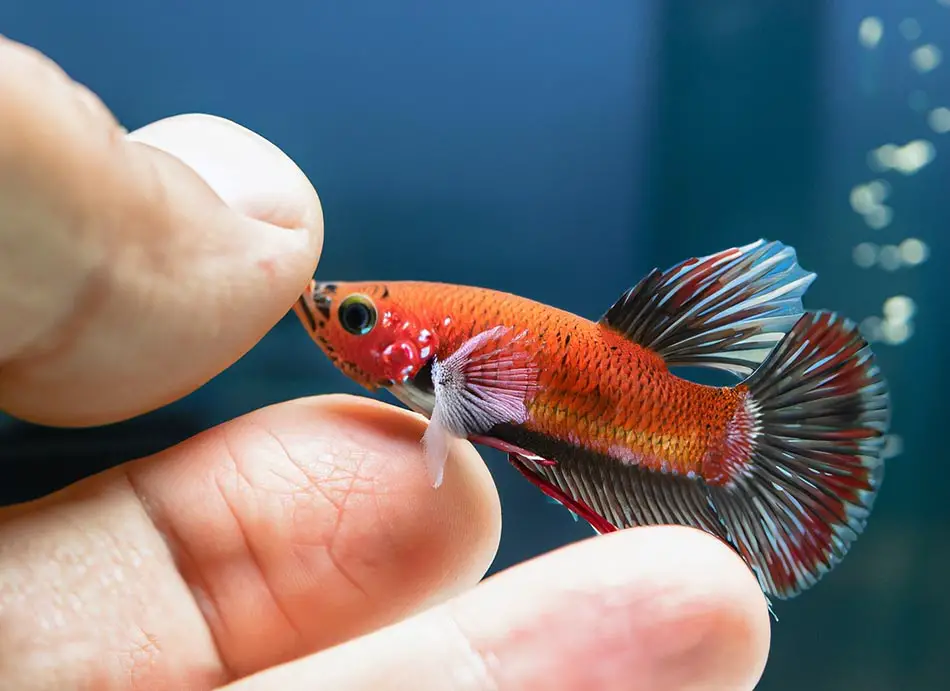
Overall, while most betta owners experience no issues with aggression from their pets, understanding why certain behaviors occur can help prevent any biting or aggressive behavior, which is more likely to cause them an injury.
Taking all necessary precautions, like setting up proper breeding tanks and catching early signs of illness, will ensure a safe and happy environment both for you and your pet fish!
Is A Betta Fish Bite Dangerous
We have established that betta fish bites are harmless to people, but is a betta fish bite dangerous to other fish, and what are the potential implications of a serious bite?
While betta fish are more likely to avoid a confrontation and prefer to hide somewhere safe, when betta fish are provoked or angry, fights can occur.
During a fight, a betta fish bite can be very dangerous to an opponent, often resulting in serious fin, tail, and scale damage. Fights can last until one fish backs down or cannot continue through injury. While an aggressive bite itself is unlikely to be fatal, the resulting damage can become infected and result in death if not carefully treated.
Depending on its severity, fin damage can negatively impact a fish’s ability to swim, which can stop them from eating, and can make them a target for further attacks from other fish.
When treated, fins usually grow back, but serious infections can spread and lead to further health issues, often leading to death.
Betta fish are typically solitary fish that prefer their own company, and keeping them in a tank by themselves is the best way to prevent fights and injuries from occurring.
How Strong Is A Betta’s Bite
Despite their ability to fight so aggressively, betta fish are typically quite small compared to other aggressive species, but how strong is a betta’s bite compared to larger fish?
Pound for pound, a bettas bite is stronger than many bigger fish, and it’s often compared to highly predatory fish such as great whites and tiger sharks.
Although it’s obvious that these deadly sharks have a much stronger bite, if a betta fish was the same size, its bite would be much more powerful.
A betta’s upturned jaws are not only designed for surface feeding, but they also allow more jaw power to be applied in each bite, which is why betta fish are one of the toughest fish in their size range.
Do Betta Fish Bite When Mating
When mating, male bettas will sometimes bite the female in order to get her attention and signify his intent. Biting behavior is not always dangerous or malicious, it’s simply part of their natural mating process!
When looking for signs that your betta fish may be getting ready to mate, it’s important to keep an eye out for any aggression toward other fish in the tank. Male bettas can become territorial when trying to protect their mates from outside interference.
If the female shows signs of distress, such as hiding or increased stress levels, then chances are the male is biting her too hard during mating attempts. It’s best to move the female away from potential harm if possible.
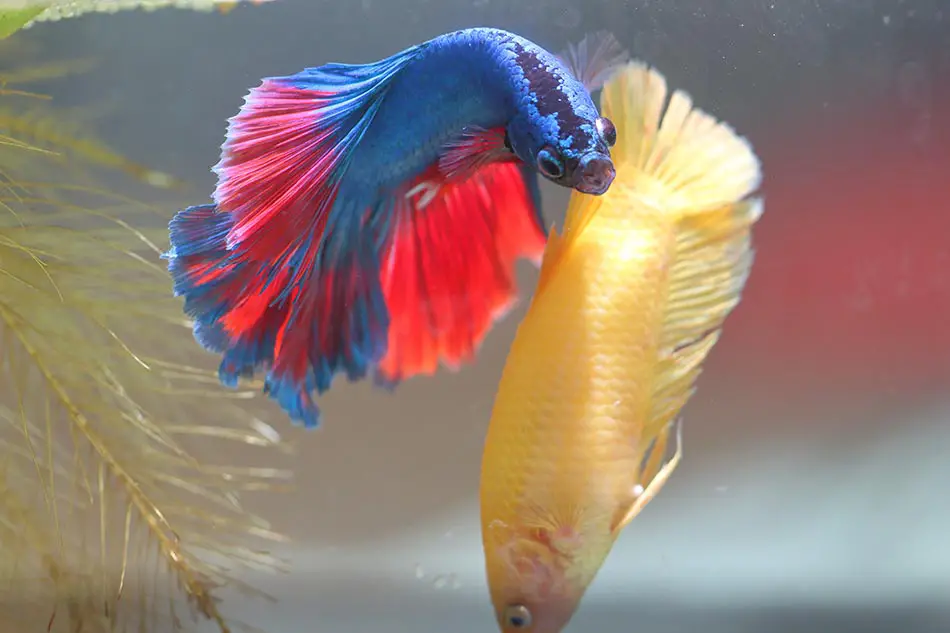
When trying to breed betta fish, it’s essential to make sure that all tank conditions are up to par beforehand and set the tank up correctly to make a comfortable environment.
Having plenty of hiding spots for both males and females helps alleviate anxiety associated with mating rituals, allowing them both some peace of mind during these stressful times.
All in all, while aggression through biting is a normal part of mating between two betta fish, it doesn’t necessarily mean anything more than a sign of affection between them – just like any other species!
When Biting Is A Good Sign During Mating
When your betta fish are mating, their courtship ritual can last for several hours and consists of flaring, jumping, biting, and other unusual behaviors.
Biting during mating should be gentle, and it’s always a good sign if the female doesn’t become defensive toward the male by flaring or hiding out in the corners of the tank.
While betta fish mate, they can become entwined while the male tries to squeeze the eggs from her, ready for fertilization. Often the male will gently hold the female with his teeth during the process.
When Biting Is Bad Sign During Mating
Although some male and female betta fish can live together, when mating, not all betta fish pairings are a match made in heaven, as sometimes either the male or female betta fish can reject their potential mate.
If the female becomes stressed, she won’t allow the male anywhere near her, and biting at this time is often a bad sign as it’s likely to be aggressive.
Remove the female to a separate tank before injuries occur, and don’t try mating the same pair until the next mating season arrives.
Do Betta Fish Have Teeth When They Are Born
Betta fish don’t have teeth at birth, as it takes several weeks for the first teeth to push through. Because baby betta fish lack teeth when they are born, their diet should consist of small aquatic insects and insect larvae, such as baby brine shrimp, that can be easily digested.
In the early stages, a baby betta’s diet should consist of soft foods that are packed full of nutrients which you can learn more about in my baby betta fish care and feeding guide.
After a few weeks, a betta’s teeth begin to develop, so larger foods can be introduced gradually while they learn to bite and chew
Do Betta Fish Lose Their Teeth
Betta fish do lose teeth throughout their lifetime, but it isn’t a common or natural occurrence. While sharks have rows of teeth in reserve, this isn’t the case with betta teeth.
Betta fish typically lose their teeth when fighting as they clamp down hard on their opponent’s fins and often won’t let go. An aggressive tug can cause a fin to tear and pull out a tooth in the process. Illness can also cause a betta’s teeth to fall out through malnutrition and muscle or cell damage.
If a betta does lose teeth, they typically grow back over several weeks but are often not as sharp or robust, especially when they first appear.
How To Stop A Betta Fish From Biting
If you have an aggressive betta fish that is prone to biting itself, your finger, or other fish in the tank, there are several ways to try and curb this behavior.
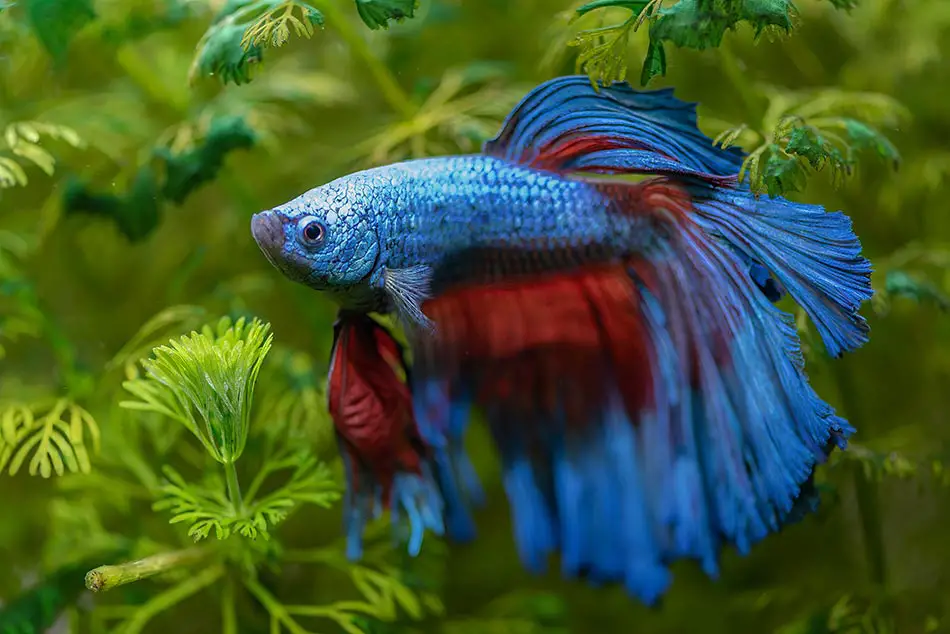
Create A comfortable Stress-Free Environment
The first step to stop a betta fish from biting is to evaluate its environment. Is your betta fish comfortable with the tank setup? Betta fish need plenty of space to swim around, they need some territory, and plenty of hiding spots for when they feel threatened.
Ensuring you have a betta tank that is at least 10 gallons allows you enough space to add some ornaments and plants that provide cover and places where your betta can retreat.
Ensure your betta tank’s water parameters are healthy and the tank water is clean, or your betta may get stressed and develop a short temper.
A betta that is happy in its environment is less likely to bite out of aggression or frustration.
Handle Your Betta Gently
As most betta fish bite when feeling uncomfortable or threatened, gentle handling is required. If your betta feels that you are a threat, it will try to nip at your fingers and may flare angrily to warn you off.
Although it isn’t necessary to handle a timid betta fish, on occasion, you may need to net them, and this can create a feeling of discomfort or fear toward you, which may result in aggressive behavior toward other fish in the tank.
Every interaction with your betta fish should be calm, and you should back off at the first signs of stress until your betta warms to you and becomes more trusting. This way, they become friendlier over time and easier to handle in general.
Create A Regular Feeding Routine
A hungry betta fish is more likely to bite, so ensure you provide a regular feeding routine. Betta fish should be fed two or three times per day, and the ideal betta diet should be varied between betta pellets and protein-rich live or frozen foods.
Not only will a well-fed betta fish be less likely to bite through their predatory feeding instincts, but a happy betta is less likely to want to fight.
Choose Suitable Tank Mates
Adding your betta to a tank full of unsuitable tank mates is not only cruel and stressful for your betta but is also guaranteed to end up with fighting and biting behavior.
Unsuitable tank mates are those that are naturally aggressive, look for a fight, and repeatedly invade your betta’s space. Aggressive fish that you should avoid are most cichlid species, gouramis, angelfish, and most shark species.
The best tank mates are smaller and less threatening such as neon tetras, harlequin rasboras, ember tetras, and guppies. Larger fish can include mollies, loaches, fancy goldfish, and plecos.
Remove Other Tank Mates
Even when you mix suitable tank mates with a betta fish, sometimes individual temperaments make them aggressive and intolerant of other fish. If specific fish are causing problems, you need to remove them from the tank.
If you have a naturally aggressive betta that is biting its tank mates, the only solution is to put it in a tank by itself. Betta fish are typically solitary fish, even in the wild, so they may be happier living alone.
Check For Illness
A betta that is suddenly aggressive and biting itself or other tankmates for no apparent reason may be unwell. Look for signs of illness. One typical reason why a betta fish bites themselves is parasites or fungal infections that are causing pain, discomfort, or itching.
Betta fish often bite their own fins to relieve an itch or to remove parasites, or you may notice them frequently rubbing against rocks (known as flashing) to knock parasites off.
There are many treatments for skin infections, fungal infections, and parasites that provide immediate relief and should prevent biting.
Wrap Up
So, do betta fish have teeth? Absolutely! And while betta fish are often beautiful, social creatures, they can have a fierce temperament in certain situations.
A betta’s jaw power and rows of razor-sharp teeth allow them to inflict serious injuries to other fish, but these teeth are so small they are no match for human skin, making them harmless to people.
Betta fish typically use their teeth to eat their carnivorous diet, biting with their sharp incisors and chewing food with their rounded pharyngeal teeth to aid the digestion process.
Other ways that bettas use their teeth are for defense and fighting, mating, and feeling their environment. Betta teeth can inflict serious injuries to themselves or other fish, so precautions should be taken to prevent betta bites whenever possible.
Overall, understanding the temperament and needs of this beautiful fish species will help you to provide the best care in a comfortable and calm environment.


